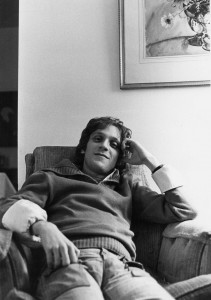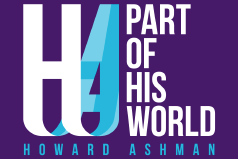March 14, 1991 - A Memory
 I am not prepared, of course. How could I be prepared? The phone rings and I take a final quick sip of tea as I pick it up, my mind already on the day ahead – office and meetings and deadlines. It was my last moment of knowing my brother was safely in my world.
“Sarah,” the private nurse’s Jamaican lilt softened her words, “he’s gone. Howard died a few minutes ago. Sarah, he was peaceful, you should know he went peacefully.”
I am not prepared, of course. How could I be prepared? The phone rings and I take a final quick sip of tea as I pick it up, my mind already on the day ahead – office and meetings and deadlines. It was my last moment of knowing my brother was safely in my world.
“Sarah,” the private nurse’s Jamaican lilt softened her words, “he’s gone. Howard died a few minutes ago. Sarah, he was peaceful, you should know he went peacefully.”
I am proud of myself, reacting coolly, as an adult should. I ask the questions. When? Does Bill know? And finally, Can I see him?
“Yes, but hurry. I will close the door. They like to clean the room quickly. I don’t think they’ve called transport to take him downstairs, yet. Hurry, I’ll try to keep him here for you.”
Howard is waiting. I tell Ron, leaving him no time to react or even to comfort me. I have to get to the hospital, I have to see him before he was gone to the other side, the side of transport and morgues and funeral homes and cemeteries.
Ron sits beside me as I will the taxi to move faster. I take great pleasure in the driver’s skidding acceleration, his zigzags through traffic. His blind urgency, his thoughtless aggression seems perfectly reasonable to me. It is winter and the streets are slick with ice.
My footsteps echo through the hospital lobby. There are few people to absorb the usual lights and sounds of so bright and public a space. It is early morning, well before visiting hours. A guard, large and officious in his uniform, grim and bored in his thankless job, sits in front of the elevators that beckon to me, a line of moving boxes, all of them waiting to take me to Howard.
I breeze past him, like Cinderella on her way to the Ball, Ron hurrying after me, having stopped to pay the cabdriver I have ignored. He sees the guard grab my arm hard.
“Hey,” Ron yells to the guard.
I shrug the man’s hand off of me, barely feeling him in my blind dash to Howard’s side.
“You can’t go up,” the guard says. “Visiting hours start at 11.”
Ron rushes over and begins talking to the guard, explaining what has happened but the guard is angry, he has been disrespected. Their voices rise into barroom territory as the doors of the farthest elevator open and I run.
Ron shoulders his way through the closing elevator doors and takes my hand. “Jesus,” he says. And for the rest of the quick ride, we stand together silently, watching the numbers of each floor light up as we are carried upward.
I half expect to see the guard waiting for us when the doors open but there are only nurses, busy catering to the early morning needs of their living patients.
Howard’s is the only door on the corridor that is closed.
I go to the door and hesitate. After the blind rush to arrive I do not want to open the door. For the first time in my life, I am afraid of Howard. His new state of being – of not being – is one to which he will not welcome me. He has gone to this place alone, leaving me behind, finally and forever.
Ron puts an arm around my waist and opens the door. Together, we step inside.
The nurse has lowered the blinds but the morning sun still shines into the room. Howard is in the bed, his eyes closed. There is no IV in his arm, no oxygen tube in his nose. The equipment has been cleared away. I want to believe he is still in the room, hovering over me, watching. I tell no one, embarrassed by this late desperate grab for religion and angels.
I go to sit next to him on the bed. Together, the nurse and Ron say no as if to stop me from stepping into a large, foul puddle. I turn to them, curious. Is there something on the bed? Are they suddenly concerned that I will catch disease from this man I kissed goodnight twelve hours earlier?
I stand by the bed and stroke my brother’s forehead. And then I don’t know what else to do and stand looking at him until the nurse finally says, “You should take his things. Whatever you want. If you don’t the hospital will.”
I don’t understand but Ron takes a plastic bag out of the closet and opens it. I begin to gather Howard’s things, a package of underwear he had asked me to buy. Ron and the nurse look at me strangely and I put the package down. But I find his watch and glasses and his jacket made of soft Italian leather and put them in the bag Ron has handed me.
“He was a good man, your brother,” the nurse says. “And he loved you very much.”
It’s not enough but I thank her and move toward the door. I look back one final time. He hasn’t moved. I knew he wouldn’t but his existence in the world is still more real to me than his disappearance.
Once more I stand in the elevator, this time feeling the miniscule disconnect as the space I inhabit rushes downward while my body hesitates slightly above. The guard is gone from the lobby. A small moment of grace on this graceless day.
